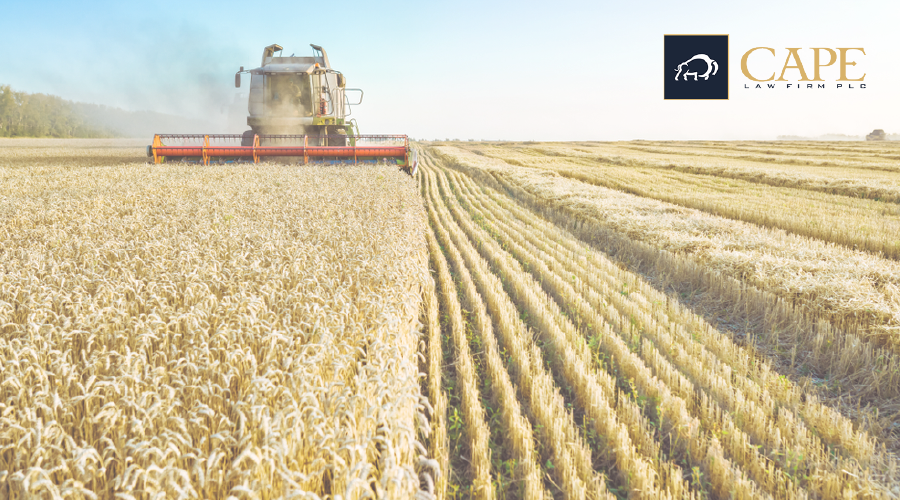Right-to-Repair Farm Equipment gets Federal Push
Federal legislation was introduced in the Senate which aims to help farmers repair their own equipment. Tractors and other farm equipment have become highly digitized with software, sensors, and related technologies over the last two decades, making the machinery more accurate and efficient. But when a break-down or malfunction occurs, repairs can only be made by dealer technicians with proprietary tools and software. The result is higher repair bills and delays at critical times in crop production. We’ve reported on this issue several times (here and here are two examples) and it highlights the growing tension between manufacturers’ intellectual property rights and traditional concepts of private property ownership.
It is worth pointing out that this is not the first example of agriculture being treated differently with respect to intellectual property rights. The Plant Variety Protection Act, passed in 1970 to give I.P. protection to sexually reproducing plant varieties, included a section that allowed farmers to save seed of a protected variety.
While the Right-to-Repair movement encompasses all kinds of digital technology (cell phones, for example) it has become a lightning rod for equipment repair in the Ag community. The legislation introduced by Senator Jon Tester, also a farmer, would require manufacturers to:
- Make available any documentation, part, software, or tool required to diagnose, maintain, or repair their equipment.
- Provide means to disable and re-enable an electronic security lock or other security-related function to effect diagnostics, repair, or maintenance.
- Permit third party software to provide interoperability with other parts/tools, and to protect both the farmer’s data and equipment from hackers.
- Ensure that when a manufacturer no longer produces documentation, parts, software, or tools for its equipment that the relevant copyrights and patents are placed in the public domain.
- Ensure parts are replaceable using commonly available tools without causing damage to the equipment, or provide specialized tools to owners or independent providers on fair and reasonable terms.
- Return data ownership to farmers. Manufacturers currently collect and sell all the data generated by farmers, and this data is the farmers’ “secret sauce” for how they conduct their business.
You can read more about Senator Tester’s bill here.
CLF’s Reader Feedback
We love getting feedback from our Readers, even if is just to point out our terrible grammar and typos.
Recently we received some interesting Reader feedback regarding the decline of American white oak trees in the nation’s forests reported in our last newsletter. Coming from farm country which adjoins forested acres, the Reader pointed out that increased use of dicamba herbicides for dicamba-tolerant crops is causing quite a bit of injury to white oak trees, and is yet another threat to white oaks in the nation’s forests. In light of this feedback, we found that Missouri weed scientist Dr. Kevin Bradley confirmed that white oaks have extreme sensitivity to dicamba in a article published by DTN Progressive Farmer. Indeed, research on herbicide drift published in 2008 indicated that herbicides such as dicamba, 2,4-D, and glyphosate caused injury in drift simulations.
Unfortunately, the Ag community has become deeply divided on an increasing number of subjects, particularly with regard to the need for “modern” herbicide tools. We seem to have entered an age where one farmer’s benefits come at someone else’s expense, either in the local community, or to another sector of the Ag economy. While whisky-makers’ need for white oak trees may seem small in the grand scheme of things, it is worth pointing out that those same whisky-makers buy corn, wheat, rye, barley and other commodities to produce our beloved spirits. No doubt it is a small part of the market, but maybe there is more overlap in the interests of these groups, at least in the long-run. Our views are contrarian on some subjects, but it surely seems prudent to consider whether we’re making the right choices for the entire community, or just a select portion.
Cape Law Firm’s Frequently (or Randomly) Asked Questions
Can I save seed from a variety that is covered by a Plant Variety Protection Certificate?
The short answer is “yes,” but it comes with a big BUT. Section 2543 of the PVPA allows farmers to saved seed of a protected variety. The Supreme Court construed this section to mean that a farmer could save only enough seed to replant his own acreage. (The Court also noted that the text of this section was impossible to make complete sense of). Other case law has held that this provision of the PVPA can be avoided by contractual terms in the seed’s sale which prohibits seed saving. Thus, in common practice seed saving is eliminated at the time of sale.





